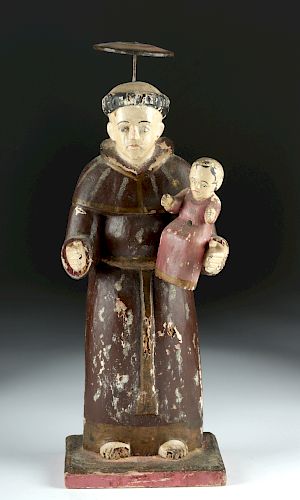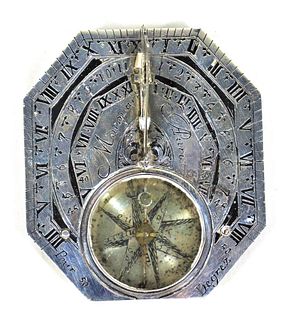19th C. Mexican Wooden Santo - St. Anthony of Padua
Lot 247
About Seller
Artemis Fine Arts
686 S Taylor Ave, Ste 106
Louisville, CO 80027
United States
Selling antiquities, ancient and ethnographic art online since 1993, Artemis Gallery specializes in Classical Antiquities (Egyptian, Greek, Roman, Near Eastern), Asian, Pre-Columbian, African / Tribal / Oceanographic art. Our extensive inventory includes pottery, stone, metal, wood, glass and textil...Read more
Estimate:
$1,000 - $1,500
Absentee vs Live bid
Two ways to bid:
- Leave a max absentee bid and the platform will bid on your behalf up to your maximum bid during the live auction.
- Bid live during the auction and your bids will be submitted real-time to the auctioneer.
Bid Increments
| Price | Bid Increment |
|---|---|
| $0 | $25 |
| $300 | $50 |
| $1,000 | $100 |
| $2,000 | $250 |
| $5,000 | $500 |
| $10,000 | $1,000 |
| $20,000 | $2,500 |
| $50,000 | $5,000 |
| $100,000 | $10,000 |
| $200,000 | $20,000 |
About Auction
By Artemis Fine Arts
Dec 20, 2018
Set Reminder
2018-12-20 10:00:00
2018-12-20 10:00:00
America/New_York
Bidsquare
Bidsquare : Warehouse Clear Out - Ancient & Ethnographic
https://www.bidsquare.com/auctions/artemis-gallery/warehouse-clear-out---ancient-ethnographic-3742
Time to clear out the warehouse, as these lots are going, going, gone... plus a we've added a nice selection of lots brand-new to auction! Artemis Fine Arts info@artemisgallery.com
Time to clear out the warehouse, as these lots are going, going, gone... plus a we've added a nice selection of lots brand-new to auction! Artemis Fine Arts info@artemisgallery.com
- Lot Description
**Originally Listed At $500**
New World, Mexico, Spanish Colonial Period, ca. 19th century CE. A large wooden santo with a kind face, hand-carved from hard wood, depicting Saint Anthony of Padua. He stands with bare feet and wearing a brown and gold robe atop a rectangular plinth while holding the Christ child in his left arm and holding his right arm out. He has a sensitive visage comprised of painted almond-shaped eyes with stylized pupils and lashes, a petite nose, semicircular ears, and thin lips, all beneath a tonsure hairstyle. A small perforation atop his head holds a small pin atop which is a halo decorated with colorful concentric circles. The Christ child sits with both arms outstretched, and wears a magenta-hued robe. Size: 5.75" W x 15.5" H (14.6 cm x 39.4 cm).
St. Anthony was a Portuguese Franciscan priest and friar who died in Padua, Italy. Despite being born into a wealthy family, he was known for his intense devotion to the poor and sick, and holds the distinction of being canonized most quickly of all the saints. He is also known as the patron saint of lost things - objects, people, and souls. In art, he is often depicted with a book and the infant Jesus, based on a commonly told story of him reading a book and seeing the Christ Child's image in it.
Santos played an important role in bringing the Catholic Church to the New World with the Spanish colonists. These religious figures were hand-carved and often furnished with crowns, jewels, and other accessories, usually funded by religious devotees, and were used as icons to explain the major figures - Mary, Christ, and the saints - to new, indigenous converts. Likewise, they served as a connection to the Old World for Spanish colonists far from home. They became a folk art tradition in the Spanish New World, from modern day Guatemala to as far north as New Mexico and Colorado. Many of them were lovingly cared for over the years, with repairs and paint added as they aged, and played an active part for a long time in the religious life of their communities.
Provenance: private California, USA collection
All items legal to buy/sell under U.S. Statute covering cultural patrimony Code 2600, CHAPTER 14, and are guaranteed to be as described or your money back.
A Certificate of Authenticity will accompany all winning bids.
We ship worldwide and handle all shipping in-house for your convenience.
#134956Right hand reattached at wrist with light adhesive residue along wrist line. Repair to front of nose. Surface wear and abrasions commensurate with age, small losses to feet, head, base, front of robes, and part of halo, with fading and chipping to areas of pigmentation, and minor inactive insect damage. Light earthen deposits throughout.Condition
- Shipping Info
-
All shipping is handled in-house for your convenience. Your invoice from Artemis Gallery will include shipping calculation instructions. If in doubt, please inquire BEFORE bidding for estimated shipping costs for individual items.
-
- Buyer's Premium



 EUR
EUR CAD
CAD AUD
AUD GBP
GBP MXN
MXN HKD
HKD CNY
CNY MYR
MYR SEK
SEK SGD
SGD CHF
CHF THB
THB















